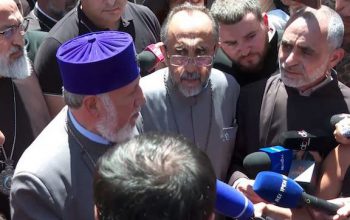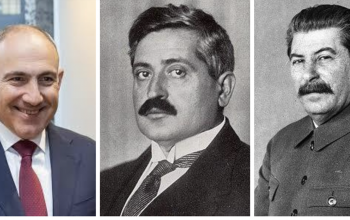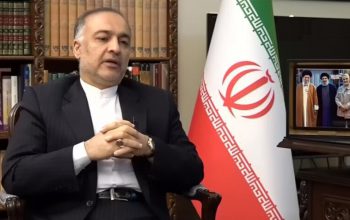By Harut Sassounian
Armenians often lament that they are a divided nation, believing mistakenly that other people are far more united. This perception mirrors families who argue behind closed doors, while assuming that their neighbors live in harmony. It’s a classic case of “the grass is greener on the other side of the fence.”
However, internal divisions exist everywhere, including in Azerbaijan and Turkey. Azerbaijan’s jails are filled with protesters and dissidents who oppose the Aliyev regime. Meanwhile, Turkey has seen millions take to the streets of Istanbul and other cities, outraged by the politically motivated arrest of Istanbul’s popular Mayor Ekrem Imamoglu. Pres. Recep Tayyip Erdogan ordered Imamoglu’s imprisonment, fearing he could be a formidable challenger in next year’s presidential elections.
One of the most persistent Armenian misperceptions is the notion that Jews are totally united. In reality, Israeli political parties are deeply polarized and rival Jewish-American organizations often oppose each other. Years ago, I expressed my belief in Jewish unity in an editorial lamenting Armenian disunity, only to be corrected by Jewish Heritage newspaper publisher Herb Brin. He argued that the Jewish community experiences significant internal conflict, including lawsuits between leaders and violent episodes. A stark example is the assassination of Israeli Prime Minister Yitzhak Rabin in Tel Aviv in 1995, not by a Palestinian, but by an Israeli Jew.
Perhaps the most extreme case of Jewish disunity occurred in 2008, when a dozen ultra-orthodox rabbis met in New York City with Iranian President Mahmoud Ahmadinejad, just a day after he had denounced “Zionist murderers” at the United Nations. These rabbis believe that the state of Israel should be dismantled, adhering to the Torah’s prohibition against founding a Jewish state before the Messiah’s arrival. They even support Palestinian sovereignty over the Holy Land.
During the meeting, the Iranian President described Zionism as a political movement “that seeks wealth and power” and expressed his desire that “God willing, it will be destroyed soon.” The group’s senior rabbi, Moshe Ber Beck, told Ahmadinejad: “That we have the honor and privilege to meet with such a distinguished person who understands the difference between Zionism and Judaism is for us a tremendously happy occasion.” After the meeting in a Manhattan hotel, Ahmadinejad posed for photographs with the rabbis.
Turkish Americans, too, face deep divisions. Recently, a major dispute erupted between the Assembly of Turkish American Associations (ATAA) and Turkish Ambassador Sedat Onal. The ATAA, the largest Turkish-American organization with over 50 chapters throughout the United States, hosts an annual conference and gala that “brings together ATAA members, Turkish Americans, community leaders, and scholars from across the nation, Canada and Turkey,” according to ATAA’s website.
This year’s conference and gala, held at the Westin Crystal Hotel in Arlington, Virginia, on May 2-3, 2025, was followed by ATAA’s General Assembly on May 4. A reception was held at the Capitol House Office Building, at the Education Subcommittee Hearing Room, in the evening of May 2. One of the panel discussions was titled, “Dealing with the Armenian Diaspora: Challenges that Turkish Americans Face!” The keynote speaker was Ergun Kirlikovali, ATAA’s Former President (2011-13) and current Trustee. Kirlikovali is a notorious genocide denier. Years ago, at a hearing held by a California State Assembly Committee on the Armenian Genocide, he made the appalling remark that “the fish in the Euphrates River were spitting Armenian eyes.”
This year, a serious problem arose that caused a split between the Ambassador of Turkey Sedat Onal and the ATAA after it issued on March 19, 2025, a public statement announcing that it “strongly condemns and protests the unjust detainment of Ekrem Imamoglu, the democratically elected Mayor of Istanbul Metropolitan Municipality. This politically motivated action is a direct attack on democracy, the rule of law, and the fundamental rights and freedoms of the Turkish people.”
Turkish ambassadors usually attend ATAA’s annual conference and deliver a keynote speech. However, Amb. Onal, following ATAA’s criticism of the Turkish government’s arrest of Mayor Imamoglu, cancelled his participation in the conference.
On April 19, 2025, Ibrahim Kurtulus, a self-described Turkish “community activist,” in a letter to Amb. Onal, applauded his withdrawal from the ATAA’s conference. Kurtulus also criticized the ATAA for organizing and promoting an “anti-Turkey sentiment” which serves to “delegitimize Turkey’s standing on the international stage.”
Within days of Kurtulus posting his letter on the website of the Turkish Forum, another Turkish-American by the name of Murat, expressing his disagreement with Kurtulus, responded in the Turkish Forum: “What an absurd letter. You are confusing interests of the state and the country with the interests of one-man rule, a regime no longer a full democracy, increasingly oppressing its people. The ambassador has simply become a tool of this one-man rule naturally, extending the divisive policies all the way across the ocean.”
In conclusion, Armenians are not the only ones who experience internal divisions. However, given the existential threats facing Armenia, unity is more crucial now than ever before. As Marco Antonio de Dominis famously declared in the 17th century: “in essentials unity; in non-essentials liberty.”




